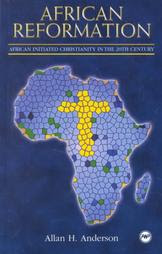 Allan H. Anderson, African Reformation: African Initiated Christianity in the 20th Century (Trenton, NJ: Africa World Press, Inc., 2001), 282 pp.
Allan H. Anderson, African Reformation: African Initiated Christianity in the 20th Century (Trenton, NJ: Africa World Press, Inc., 2001), 282 pp.The twentieth century witnessed the rapid expansion of Christianity throughout Africa. One of the main avenues of growth was in African Initiated Churches (AICs). These churches began in Africa and were started by Africans (not missionaries). What can we learn about their origins and development? How should we understand their place in global Christianity? Allan Anderson answers these questions in African Reformation. A white South African who is involved with AICs, Anderson combines his experience and knowledge with thorough research in this work.
The result is a book that is broken into three parts: context, history, and lessons. The author begins by seeking to characterize AICs and then moves to examining their causes. Next, he devotes a chapter to each region of Africa, summarizing the formation and progression of AICs through the twentieth century. Finally, Anderson concludes by providing an analysis of AICs in light of contemporary questions and issues.
I am amazed at how much information is packed into African Reformation. It is a veritable treasure trove of data on AICs. I will regularly consult this book as I conduct research on African Christianity. It will be an invaluable resource in understanding numerous churches and denominations in Africa.
At the same time, I found Anderson's third section lacking. As an "insider," he dismisses theological challenges far too easily and goes out of his way to minimize charges of syncretism. He essentially submerges Christianity into cultures, leaving us with numerous contextual theologies rather than with an overarching revealed Theology. As a result, he denigrates theology and philosophy while emphasizing experience and the dynamic, ever-changing nature of "spiritual" Christianity.
Anderson's treatment of salvation and the gospel is especially troubling. He writes:
"Salvation" in Africa needs to be related to more than an esoteric idea of the "salvation of the soul" and the life hereafter. It must be oriented to the whole of life's problems as experienced by people in their cities and villages. . . . Many AICs see "salvation" not exclusively in terms of salvation of sinful acts and from eternal condemnation in the life hereafter (the salvation of the soul), but also in terms of salvation from sickness (healing), from evil spirits (exorcism), and from other forms of misfortune" (233).While Paul Hiebert and other missionaries today are correct in pointing out Western Christianity's unbiblical segregation of the natural and supernatural worlds leaving an excluded middle, expanding salvation itself into deliverance in this world easily corrupts the gospel. The fundamental problem in this world is our rebellion against God, not poverty, sickness, or evil spirits. Far from being esoteric, salvation from God's just wrath gives us true joy and hope. This does not mean that the gospel has nothing to do with the many challenges in our world, but they must be seen in light of our relationship to our Creator. We must distinguish between salvation in Christ and the many other ways that God works in this world.
In any case, there is a lot to like about Anderson's book. He has done all of us who are involved in African ministry a great service by providing so much material in one place. At the same time, his analysis must be read critically. For the discerning reader, African Reformation will prove tremendously useful.



